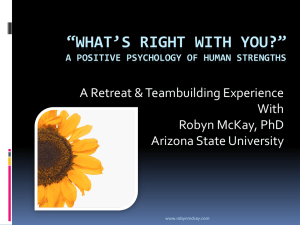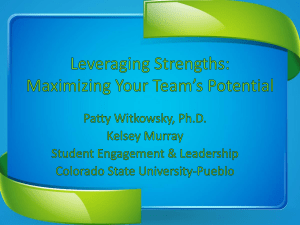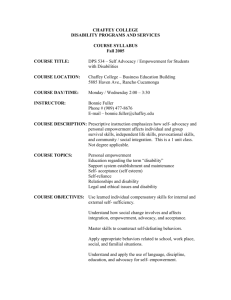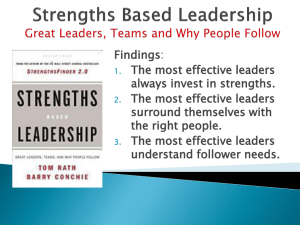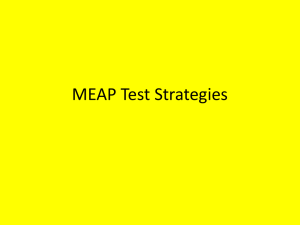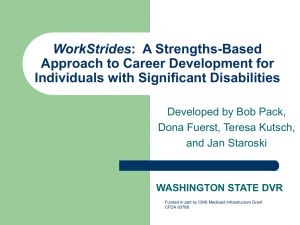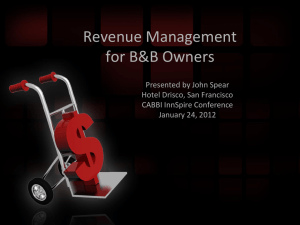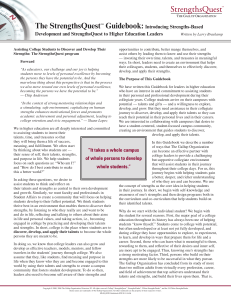Discovering Your Strengths
advertisement
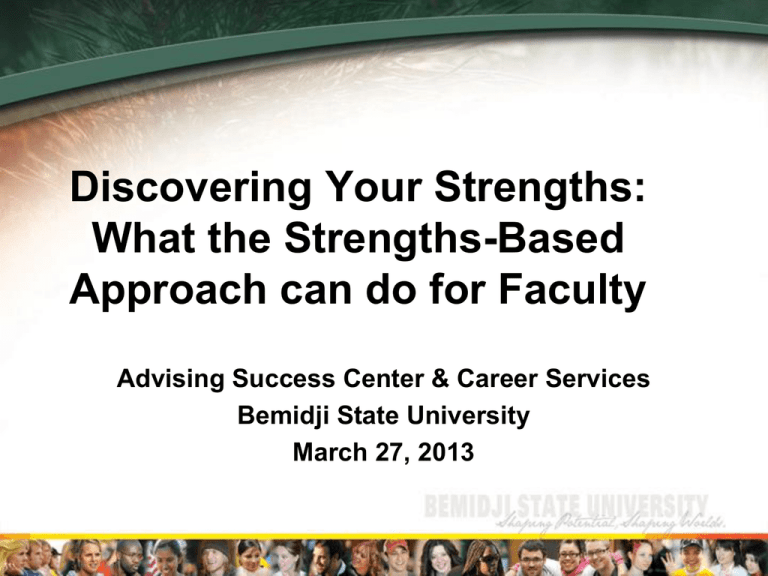
Discovering Your Strengths: What the Strengths-Based Approach can do for Faculty Advising Success Center & Career Services Bemidji State University March 27, 2013 INTRODUCTIONS Margie Giauque Individualization Communication Empathy WOO Developer Zak Johnson Responsibility Relator Analytical Individualization Developer CLIFTON STRENGTHFINDER 2.0 Donald Clifton was a professor at the University of Nebraska, Lincoln, in psychology for over 30 years was know as the Father of Positive Psychology. • Based on 40 years of study of human strengths , Donald Clifton along with The Gallup Organization and Selection Research, conducted 2 million interviews and came up with 400 themes of talent that great employees possessed. • They condensed those 400 into a smaller number and created a language of 34 common talents THE STRENGTHS APPROACH: THE 34 TALENT THEMES Achiever Activator Adaptability Analytical Arranger Belief Command Communication Competition Connectedness Consistency Context Deliberative Developer Discipline Empathy Focus Futuristic Harmony Ideation Includer Individualization Input Intellection Learner Maximizer Positivity Relator Responsibility Restorative Self-Assurance Significance Strategic Woo Weakness Fixing. . . The wrong assumptions • All behaviors can be learned - If you try hard enough, you can do it. - If you want it badly enough, you can do it. - If you dream it, you can achieve it. • The best in a role all get there exactly the same way. • Weakness fixing leads to excellence. Strengths Building. . . The right assumptions • Some behaviors can be learned. Many are nearly impossible to learn. There is a difference between talent, skills, and knowledge. • The best individuals in a role deliver the same outcomes, but may use different behaviors. • Weakness fixing prevents failure. Strengths building leads to excellence. Concept of StrengthsQuest? • You have a group of talents within you. • Your greatest talents hold the key to high achievement, success, and progress to levels of personal excellence. • Becoming aware of talents builds confidence/provides a basis for achievement. • Learning how to develop and apply strengths will improve your levels of achievement. • Each of your talents can be applied in many areas including relationships, learning, and leadership. StrengthsQuest Formula for Success Skills Talents Knowledge Strengths • Discover • Develop • Apply SQ at BSU • • • • • Spring 2009 Introduced StrengthsQuest (SQ) to Bemidji State University. Fall 2009 had all new entering freshmen through FYE courses take the assessment. Career Services to presents to FYE students on using your strengths to choose a major. We use it in Academic and Career Advising Sessions. Continue to have FYE students take the assessment (20092012). StrengthsQuest at BSU • StrengthsQuest in First Year Experience (FYE) All students in FYE are issued a SQ code • At the conclusion of fall semester 2012, 2500 students, faculty, and staff have taken SQ. • New Student Orientation T-Shirts “Do you know your top five?” • SQ is making a difference because it fits- advising and learning! Orientation T-shirts Why isn’t everyone living their strengths? Most people are not aware of, or unable to describe their own strengths. . . Or the strengths of the people around them. Rath, 2007 My Strengths and How I Use Them • Take five minutes to complete. • Write down your top five themes of talent. • Add a brief description. • Why do you think it is a strength? • When/Where have you recently used this strength? SEVEN PRINCIPLES YOU CAN USE TO MAKE THE MOST OF YOUR TALENTS: 1. Know your talents. 2. Value your talents and assume personal responsibility for using them in strengths development. 3. Talents are most powerful when inspired by a personal mission. 4. Healthy, caring relationships facilitate the development of strengths. 5. Reliving your successes helps you develop strengths. 6. Practice your talents. 7. Teaching leads to learning. • To gain further understanding of talents, teach others about them. WHY A STRENGTHS-BASED APPROACH PROMOTES STUDENT ACHIEVEMENT • Strengths Awareness Confidence Self-EfficacyMotivation to ExcelEngagement • Apply strengths to areas needing improvementGreater Likelihood of SUCCESS STRENGTHS PARADIGM IN EDUCATION • Engages students in something other than fear. • Levels the playing field among students and between student/educators (mentors). • Provides positive language and value-added observations regarding behavior. • Reframes the concept of “student success”. IDENTIFYING STUDENTS’ GIFT AND STRENGTHS • A major reason students leave school is because they are unsure of their major and/or career AND are not getting the help they need to figure that out. • Students who are aware of their gifts and strengths find it easier to select a major. StrengthsQuest Resources www.strengthsquest.com • Access to online StrengthsQuest book and resources • Action items for applying strengths to academic advising. • Curriculum development and Teacher Action Items • More information learning about all 34 Themes to help understand others • Templates for making door signs with top five Door Signs/Bulletin Boards Name Signs/Name Badges Bulletin Boards Contact Information Margie Giauque Director Career Services mgiauque@bemidjistate.edu (218) 755-2775 Zak Johnson Director Advising Success Center zjohnson@bemidjistate.edu (218) 755-4226
